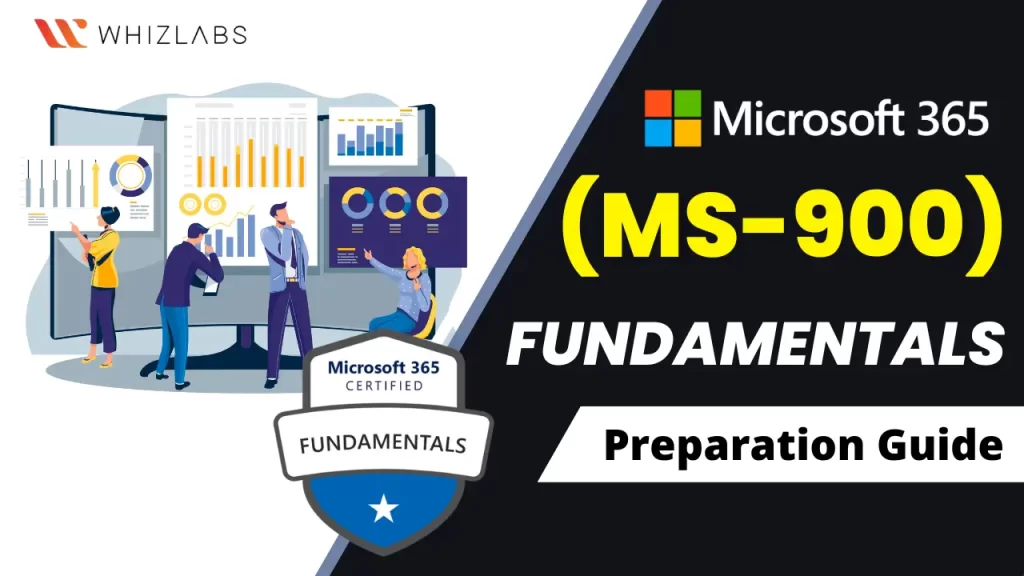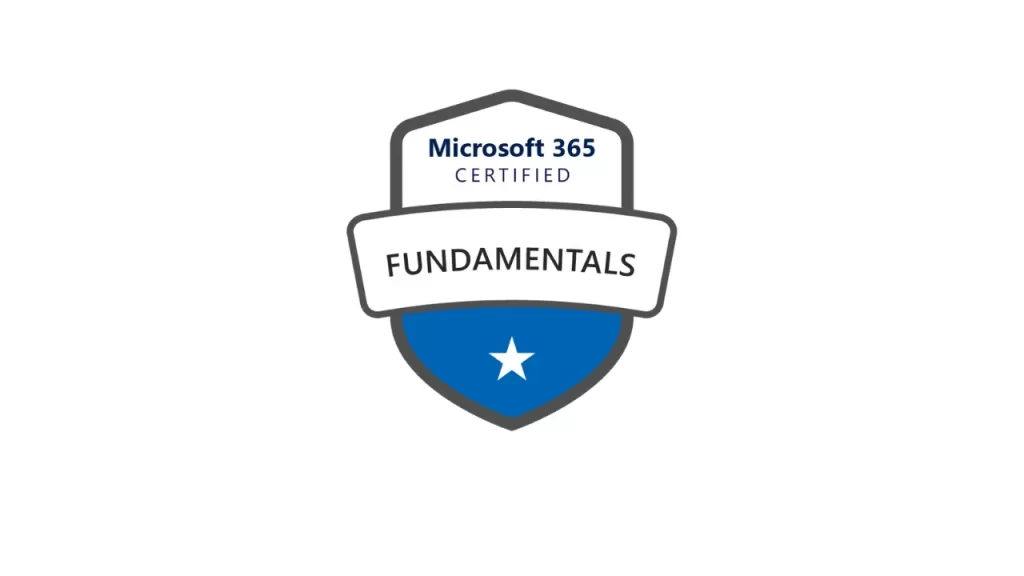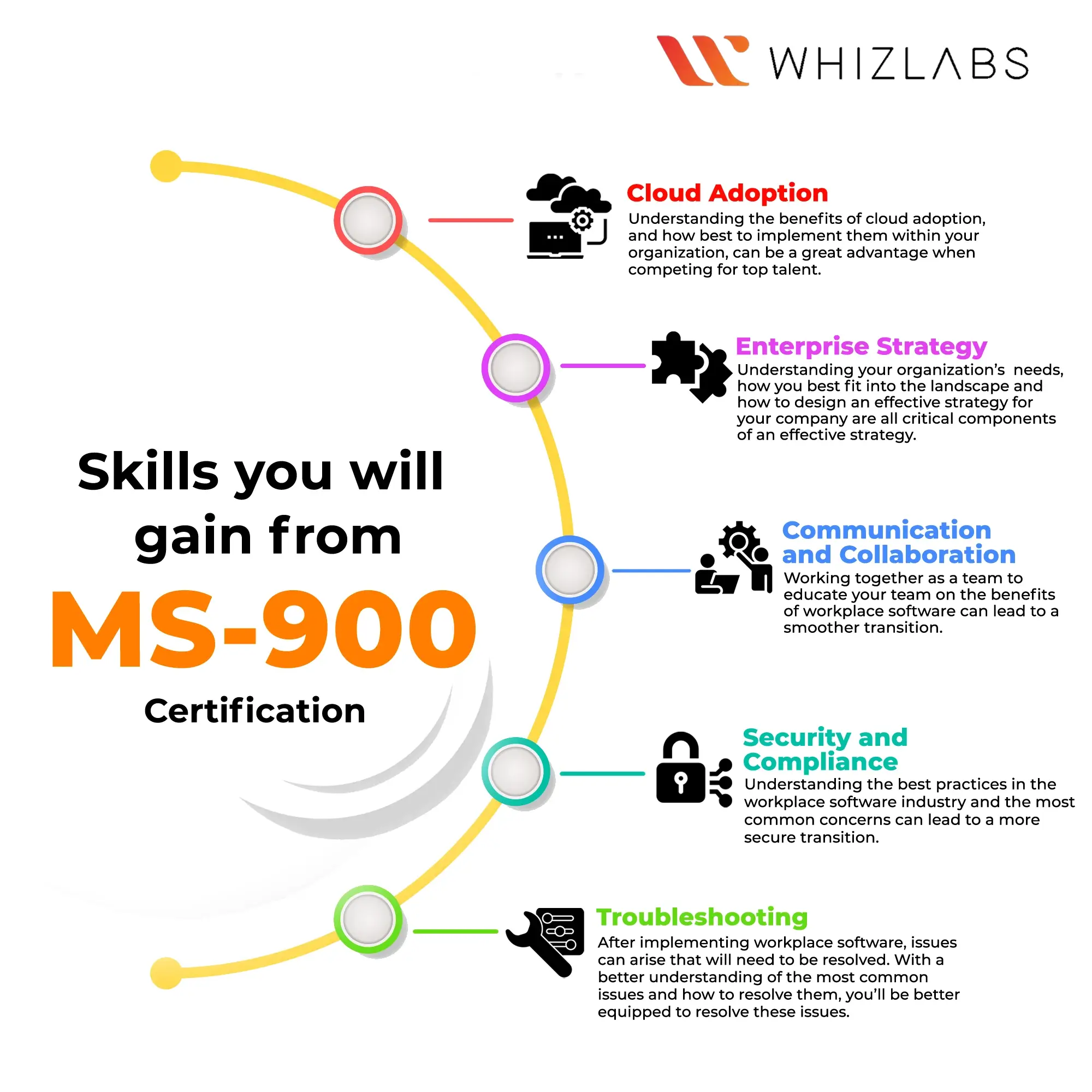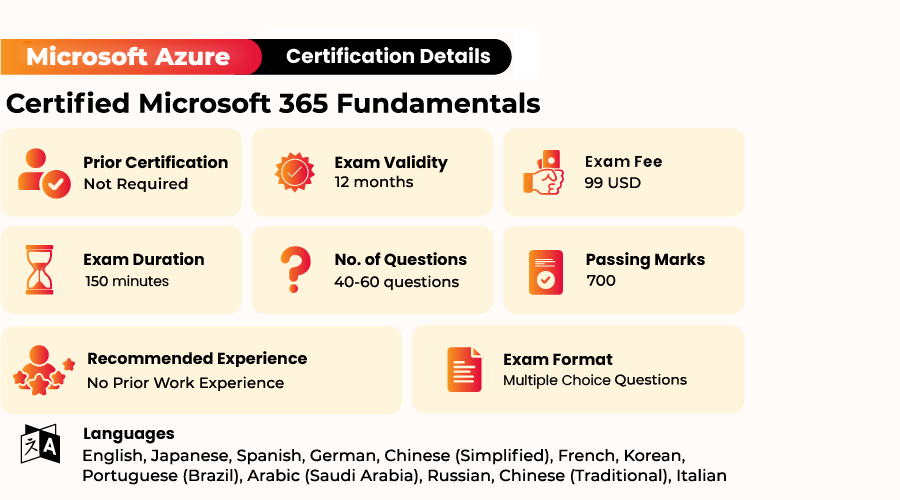Are you planning to take the MS-900: Microsoft 365 Fundamentals exam? If so, then you’ll want to make sure you’re fully prepared before sitting for the exam. This exam is designed to test your knowledge and mastery of the cloud based solutions or Microsoft 365. This exam covers a range of topics from Microsoft 365 core services to security and compliance.
In this guide, we’ll cover the key topics that will be covered on the exam, who should take this MS-900 certification, overview of the exam, detailed syllabus, study materials to refer to and will provide some tips on how to study effectively.
Let’s dive deeper !
All About Microsoft 365 Fundamentals MS-900 certification exam
The Microsoft 365 Fundamentals MS-900 exam is a fundamental-level exam that covers the core concepts of Microsoft 365. This exam is designed for candidates who are just getting started with Microsoft 365 and are looking to gain a basic understanding of how it works.
The MS-900 exam covers the following topics:
Microsoft 365 core services: This includes an overview of Microsoft 365 services, as well as how to manage them.
Security and compliance: This section covers topics like data loss prevention, security features in Microsoft 365, and compliance requirements.
Microsoft 365 pricing and licensing: This section covers topics like Microsoft 365 plans and licensing options.
What are the skills you will gain from the MS-900 certification?
The MS-900 exam will help you gain an in-depth knowledge of developing solutions for the Software as a Service (SaaS) cloud model. You will also learn Microsoft 365 solutions to improve productivity, facilitate collaboration, and optimize communications.
Additionally, the MS-900 certification exam will assess your technical proficiency in doing the following tasks:
- Cloud Adoption – Understanding the benefits of cloud adoption, and how best to implement them within your organization, can be a great advantage when competing for top talent. By understanding how to implement and sell cloud-based software, you’ll be able to lead the transition to cloud-based software within your organization.
- Enterprise Strategy – Understanding your organization’s needs, how you best fit into the landscape and how to design an effective strategy for your company are all critical components of an effective strategy. By understanding how to design an effective strategy, you’ll be better equipped for the day-to-day tasks of managing your organization.
- Communication and Collaboration – Working together as a team to educate your team on the benefits of workplace software can lead to a smoother transition. By listening to your team and understanding the needs of your organization, you’ll be able to lead a smoother transition.
- Security and Compliance Concerns – Understanding the best practices in the workplace software industry and the most common concerns can lead to a more secure transition. By understanding what concerns your team has, you’ll be better equipped to lead a secure transition. – Optimization – Maximizing the potential of your organization’s software is critical to keeping your organization competitive. By understanding how to optimize your software, you’ll be better equipped to lead a better transition.
- Troubleshooting – After implementing workplace software, issues can arise that will need to be resolved. With a better understanding of the most common issues and how to resolve them, you’ll be better equipped to resolve these issues.
Who should take the MS-900 certification exam?
The MS-900 certification exam is designed for individuals who want to validate their skills and knowledge in managing Microsoft 365 services. This exam is suitable for those who are already working in or interested in moving into a role such as a Microsoft 365 administrator, architect, or engineer.
- Managers – If you’re looking to advance your career within the workplace software market, there’s a strong chance you’ll need to pass this exam. With the growing popularity of workplace software, it’s important for managers to understand the benefits and how to implement them within their organization.
- System Administrators – If you’re currently managing a team of system administrators, you’ll need to take the MS-900 exam. By passing this exam, you’ll prove to your team members that you understand the ins and outs of workplace software. This may be especially helpful if you’re trying to advance to a project management role.
- Project Managers – Being able to lead a project management team is critical for effectively managing large-scale projects. By passing the MS-900 exam, you’ll be able to show your team members that you understand the best practices in project management.
- Support Technicians – If you’re a technician that’s responsible for helping your organization make the transition to workplace software, passing the MS-900 exam is a must. By passing this exam, you’ll be able to show your team members that you have a thorough understanding of workplace software.
- Marketing and Sales Managers – With the growing popularity of workplace software, it’s important for marketing and sales managers to understand what workplace software can do for their organization. By passing the MS-900 exam, you’ll be better equipped to lead a successful transition.
Why to take MS-900 certification exam on Microsoft 365 Fundamentals?
Earning a Microsoft certification can help establish your expertise and leadership skills, making you an attractive candidate for higher-level positions.
MS-900 exam is a great way to show your companys’ leadership in the workplace software market. With the increasing popularity of workplace software, it’s important for managers to understand the benefits and how to implement them within their organization.
– Many organizations are making the transition to cloud-based software, and the MS-900 exam is a great way to get a thorough education on the benefits of this transition. By being up to speed on the best practices for implementing cloud-based software, you’ll be better equipped to help your organization make the transition smoother.
– Whether you’re looking to advance your career, or you just want to make the change to cloud-based software, MS 900 exam is a great way to transition your knowledge. With the growing popularity of workplace software, you’ll need to know what’s happening in the market and how to capitalize on this trend.
What will you learn from the MS-900 certification exam?
MS-900 exam covers a variety of topics, including Azure, Windows Server, and Exchange Server. By passing this exam, you will learn the following:
- How to install and setup Azure Active Directory.
- How to manage Azure subscriptions and resources.
- How to configure and manage virtual networking in Azure.
- How to deploy, manage, and monitor Azure solutions.
- How to create and control Azure storage accounts.
- How to implement an Azure App Service.
- How to build and manage Azure SQL Databases.
- How to secure and manage Identities in Azure.
Demand for Microsoft 365 services
Pre-requisites of the MS-900 Certification exam
There are no prerequisites for the MS-900 certification exam, even though before starting the MS-900 certification exam, you should have prior knowledge before appearing for this exam includes:
– Understand the basics of Microsoft 365, including its history, features, and benefits.
– Have a good working knowledge of Microsoft 365 applications, such as Word, Excel, PowerPoint, and OneDrive.
– Be familiar with the Microsoft 365 admin center and how to manage Microsoft 365 users and groups.
– Understand how to troubleshoot Microsoft 365 issues.
– Have a basic understanding of cloud computing, networking and security concepts.
Exam Overview for MS-900 exam
Exam Domain for MS-900: Microsoft 365 Fundamentals
The MS-900 certification exam covers four domains and carries specific weightage in the exam. Here is what the MS-900 exam breakup looks like:
| Domain | Weightage |
| Describing Cloud Concepts | 5-10% |
| Describing core Microsoft 365 services and concepts | 45-50% |
| Outline security, compliance, privacy, and trust in Microsoft 365 | 25-30% |
| Describing Microsoft 365 pricing and support | 10-15% |
Describing cloud concepts (5–10%)
Detailing about the different types of cloud services available
- Detail about Microsoft SaaS, IaaS, and PaaS offerings
- Cloud-based productivity solutions for organizations and individuals
- Detail the differences between Office 365, Microsoft 365, and Windows 365
Describing the benefits of and considerations for using cloud, hybrid on premises services
- Sketch public, private, and hybrid scenarios
- Collate the pros of cloud-based services versus on-premises services
- Relate the factors that drive organizations to move to the cloud
- Detail about hybrid working strategies, flexible working strategies, and frontline workers
Describing core Microsoft 365 services and concepts (45–50%)
Describe productivity solutions in Microsoft 365
- Detail the core productivity and teamwork capabilities in Microsoft 365 including Microsoft Outlook and Microsoft Exchange, Microsoft 365 apps, and OneDrive
- Detail Microsoft 365 Apps including Word, Excel, PowerPoint, Outlook, and OneNote
- Detail work management capabilities in Microsoft 365 including Project, Planner, Bookings, and ToDo (Tasks)
- Detail business class email and calendaring solutions with Microsoft Exchange
Describe collaboration solutions in Microsoft 365
- Outline the collaboration capabilities in Microsoft 365 including Microsoft Teams, Teams Phone, Yammer, SharePoint, and Stream
- Outline the collaboration workloads of Microsoft Teams and the value that they provide
- Outline the core employee experience capabilities in Microsoft Viva
- Outline the ways that you can extend Microsoft Teams by using collaborative apps
- Outline the features of Microsoft SharePoint and Microsoft OneDrive that promote collaboration
- Detailing on how Yammer helps communities connect and grow
Describing endpoint modernization, management concepts, and deployment options in Microsoft 365
- Detail the endpoint management capabilities of Microsoft 365 including Microsoft Endpoint Manager (MEM), Windows 365 Cloud PC, and Azure Virtual Desktop
- Compare the capabilities of Windows 365 & Azure Virtual Desktop and when it makes sense to perform either
- Detail the deployment and release models for Windows-as-a-Service (WaaS) including deployment rings
- Pinpoint deployment and servicing methods for Microsoft 365 apps
Describe analytics capabilities in Microsoft 365
- Sketch the capabilities of Viva Insights
- Detail the capabilities of the Microsoft 365 Admin center and Microsoft 365 user portal
- Outline the reports available in the Microsoft 365 Admin center and other admin centers
Outline security, compliance, privacy, and trust in Microsoft 365 (25–30%)
Explain zero-trust security principles for Microsoft 365
- Recognize key components that need to be protected within an organization’s cloud and on premises infrastructure
- Detail about Zero-Trust model
Describing identity and access management solutions in Microsoft 365
- Outline the identity and access management capabilities in Microsoft 365 including Azure Active Directory, part of Microsoft Entra, and Azure Identity
- Sketch cloud identity, on-premises identity, and hybrid identity concepts
- For multi-factor authentication (MFA) set out the purpose and value of implementing
- Detail the purpose and value of conditional access
Describe threat protection solutions in Microsoft 365
- Set out Microsoft 365 Defender, Defender for Endpoint, Defender for Office 365, Defender for Identity, and the Microsoft 365 Defender Portal
- Describe Microsoft Secure Score benefits and capabilities
- Detail the most common types of threats against endpoints, applications, and identities
- Sketch how Microsoft addresses the most common threats
- Make a detail on how threat mitigation can be automated with artificial intelligence by using Microsoft 365 and Microsoft Sentinel
Describing trust, privacy, and compliance solutions in Microsoft 365
- Mark out compliance solutions in Microsoft 365
- Identify differentiation between the Service Trust portal and Microsoft Purview Compliance Manager
- Detail on how Microsoft supports data residency to ensure regulatory compliance
- Sketch information protection and governance options including data loss prevention (DLP) classification labels
- Detail about Microsoft Purview Compliance Manager, Compliance Scores, Microsoft Priva, and the benefits that they can provide to an organization
- Detail about insider risk management solutions to protect against internal threats
- Report on auditing and eDiscovery solutions
- Outline privacy management concepts
- Outline Microsoft’s privacy principles
Describe Microsoft 365 pricing and support (10–15%)
Plan, predict, and compare pricing
- Outline the pricing model for Microsoft cloud services including enterprise agreements, cloud solution providers, and direct billing
- Outline available billing and bill management options including billing frequency and methods of payment
Identify licensing options available in Microsoft 365
- Outline the available base licensing and management options
- Outline add-on licensing options
Describe the Microsoft 365 service lifecycle
- Outline private, public preview, and general availability (GA) options
- Outline the correlation between lifecycle options and pricing
- Outline use cases and capabilities for the Microsoft 365 Roadmap portal
Describe support offerings for Microsoft 365 services
- Detail on how to create a support request for Microsoft 365 services
- Outline the service level agreements (SLAs) concepts including uptime principles, service credits for refunds, SLA tiers, roles, and responsibilities
- Decide the service health status by using the Microsoft 365 admin portal or the Azure tenant portal
- Describing on how organizations can communicate with Microsoft about product and service improvements
Also Read: Microsoft 365 Fundamentals FREE Questions
Study materials to refer for MS-900 certification exam
The best way to do this is to use high-quality study materials that will give you a comprehensive understanding of the topics covered on the exam. There are a few different options when it comes to study materials, but not all of them are created equal. I have put together a list of the best study materials for the MS-900 exam, so you can make sure you are prepared.
If you are new to Azure certifications then Microsoft learning path might be the first focus to cover on your MS-900 study guide that includes:
- Describe Microsoft 365 apps & services
- Describe Microsoft 365 compliance capability and security
Second, Microsoft’s instructor-led video training course MS-900T01: Microsoft 365 Fundamentals will help you sharpen your adopting cloud services skills in Microsoft 365 deployment. It is a one-day-long video course elaborating on how Microsoft 365 solutions improve productivity, facilitate collaboration and optimize communications. Each of the numerous modules covers a separate subject that you must be familiar with for the exam.
Third, Microsoft Learn is a free, interactive, and self-paced learning platform that can help you prepare for the MS-900 exam. The platform walks you through different topics in Microsoft 365, providing knowledge checks along the way to ensure you are retaining the information.
In addition to Microsoft Learn, we also recommend using the following resources to prepare for the MS-900 exam:
- Practice tests: Use practice tests to identify areas where you need to focus your studies. These can be a great way to test your knowledge and see where you need to focus your studies.
- Official Microsoft documentation: Use the official Microsoft documentation for the MS-900 exam as a reference guide.
- Microsoft MVPs and Experts: Connect with Microsoft MVPs and Experts on social media and forums to get tips and advice on studying for the MS-900 exam.
Preparation tips for MS-900 Microsoft 365 Fundamentals certification exam
Here are a few tips to help you prepare for the MS-900 exam.
Step 1: Familiarize yourself with the exam format. The MS-900 exam is a multiple-choice, scenario-based exam. You will be presented with various scenarios and asked to choose the best course of action.
Step 2: Study the exam content areas. The MS-900 exam covers the following topics:
- Microsoft 365 Fundamentals
- Microsoft 365 Core Services
- Microsoft 365 Management and Deployment
Step 3: Use Microsoft resources. Official Microsoft documentation is always a good place to start when studying for a Microsoft exam.
Step 4: Practice, practice, practice. Take advantage of practice exams and other learning resources to help you prepare for the MS-900 exam.
By following these tips, you can help ensure that you are well prepared for the MS-900 exam.
Summary
Now that you’ve read through our MS-900 Microsoft 365 Fundamentals Exam: The Ultimate Preparation Guide, you are well on your way to passing your exam and getting your certification! With the information in this guide, you will have the skills needed to navigate the world of workplace software with Microsoft 365.
If you’ve decided to dive into the world of workplace software with Microsoft 365, you’ll need to know the ins and outs of using Office 365.
To make the process ideal, we at Whizlabs offer many preparation resources like hands-on labs, cloud sandbox environment to advance your preparations. We give free practice tests, video courses to help evaluate your preparation process.
If you have any further thoughts on this preparatory guide, feel free to comment !
- Study Guide DP-600 : Implementing Analytics Solutions Using Microsoft Fabric Certification Exam - June 14, 2024
- Top 15 Azure Data Factory Interview Questions & Answers - June 5, 2024
- Top Data Science Interview Questions and Answers (2024) - May 30, 2024
- What is a Kubernetes Cluster? - May 22, 2024
- Skyrocket Your IT Career with These Top Cloud Certifications - March 29, 2024
- What are the Roles and Responsibilities of an AWS Sysops Administrator? - March 28, 2024
- How to Create Azure Network Security Groups? - March 15, 2024
- What is the difference between Cloud Dataproc and Cloud Dataflow? - March 13, 2024




